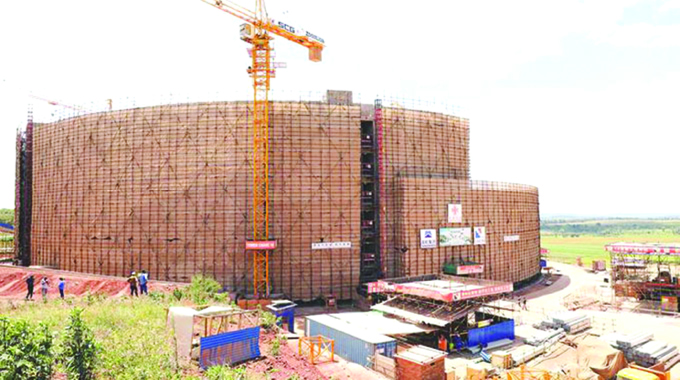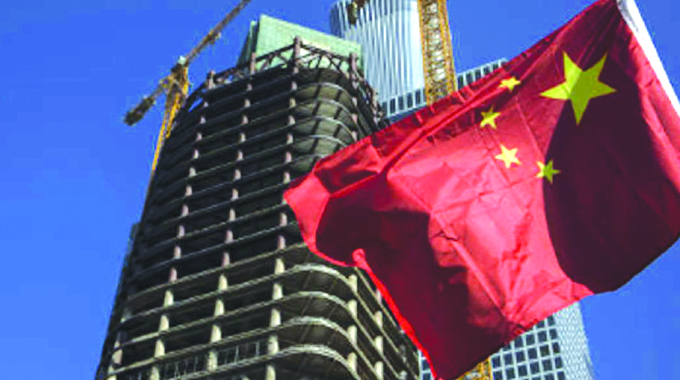China’s development brings opportunities for Africa at large

Correspondent
This year, we celebrate the 100th year of the founding of the Communist Party of China (CPC). It was founded in 1921, nine years after the ANC of South Africa was established in 1912. At the time the Chinese nation was plagued by civil war and then invasion by the Japanese. When the people’s Republic of China was set up in 1949, it was boycotted, blockaded and sanctioned by the western world. Our quest for development and industrialisation later was not without many setbacks.
Finally, it was the CPC that rallied and led the Chinese people to achieve national independence and liberation. A right path was found to prosperity and strength, a path of socialism with Chinese characteristics. In recent years in particular, under the leadership of the CPC Central Committee with Comrade Xi Jinping at its core, China has scored a succession of historic achievements in its development, and socialism with Chinese characteristics has entered a new era.
Let me use a few examples to illustrate the great achievements of CPC.
In just a few decades since the founding of New China, we managed to turn the country from being poor and weak into the second largest economy in the world. China’s GDP was 67,9 billion yuan in 1952, and 90,03 trillion yuan in 2018, up by 174 times in real terms. Per capita GDP soared by 70-fold, from 119 yuan to 64 600 yuan.
We have supported nearly 20 percent of the world’s population with only 9 percent of the world’s total arable land; Over 850 million Chinese have been lifted out of poverty and average life expectancy has surged from 35 to 77 years. We now have a middle income group counting over 400 million people; and we have put in place the world’s largest social security and compulsory education systems. We are the first developing country to achieve the United Nations Sustainable Development Goal on poverty eradication. Scholars call it “the greatest economic revolution in the history of mankind”.
China has also left indelible footprints through technological advancements in such areas as military power, artificial intelligence, medical research, e-commerce and infrastructure development.
Over the past decade, the country has added over 35 000km to its high-speed rail (HSR) network, with the total length that far exceeds the rest of the world combined. Train speeds have increased from a maximum of 200 km per hour to 350 km per hour — the fastest in the world.
The HSR offers shorter travel times, comfort, convenience, safety and punctuality and is by far the largest passenger-dedicated network of its type in the world.
China completed its worldwide BeiDou navigation satellite system with the launch of its final satellite on June 23, 2020.
In the middle of May 2021, an uncrewed Chinese spacecraft successfully landed on the surface of Mars, leaving a Chinese footprint on Mars for the first time.
China’s rapid development has brought numerous opportunities to the world. For over 10 years, China has contributed to more than 30 percent of global growth and more than 70 percent of global poverty reduction.
Since 2008, China has received 25 percent of exports from the least developed countries. In the face of mounting protectionism, China has hosted the China International Import Expo for three years running to share its opportunities with the rest of the world. China will import over US$22 trillion worth of goods over the next decade, and the country is accelerating its opening up in spite of the global coronavirus pandemic.
In 2020, the value of outward foreign direct investment (FDI) from China amounted to approximately 132,94 billion US dollars. In recent years, China has become the world’s largest foreign direct investor in Africa.
China has put off more loan repayment under the Debt Service Suspension Initiative for Poorest Countries than other G20 members.
Since the Belt and Road Initiative (BRI) was launched seven years ago, China has registered more than 7,8 trillion US dollars in trade and 110 billion US dollars in direct investment with BRI partner countries, benefiting African companies among others. A World Bank report suggests that by 2030, globally, the Belt and Road Initiative could contribute to lifting 7,6 million people from extreme poverty and 32 million from moderate poverty.
During the Covid-19 pandemic, China has provided urgently needed supplies to 150-plus countries and 13 international organizations, including more than 280 billion masks, 3,4 billion protective suits, and 4 billion testing kits.
At the recent Global Health Summit, President Xi Jinping has announced that China is the first to pledge making vaccines a global public good, and has so far provided 300 million doses to the world and China will provide still more vaccines to the best of its ability. China will provide an additional 3 billion US dollars in international aid over the next three years to support Covid-19 response and economic and social recovery in other developing countries.
With the background of the above development, the bilateral relations between China and Zimbabwe have entered the path of rapid development in recent years. The top leadership of the two countries has been keeping close consultation through various means. Though facing the barriers of the pandemic, the bilateral projects including new parliament building, Harare International Airport expansion and pharmaceutical warehouse are progressing smoothly. Most importantly, through the hard efforts of both sides, Zimbabwe has been rolling out the vaccination program ahead of many other African countries.
On the future of the bilateral relations, we would like to underscore the following points:
First, we shall support each other in choosing its own path of national development. We congratulate Zimbabwe for its achievements under the leadership of President Mnangagwa. We support the efforts of Zimbabwean people in carrying out the land reform and the empowerment program. We call upon those countries to lift the illegal sanctions against Zimbabwe immediately.
Some countries impose their own democratic system on others, or trying to command the world in the name of “democracy”. It is nothing but an insult on and a travesty of democratic values. Those days that a few countries dominated us with force have passed forever.
Second, we shall support each other in resolutely safeguarding its sovereignty, security and development interests. A few people in the western world concocted the lies of “detention camps”, “genocide”, “forced labor” and “systemic sexual abuse” on Xinjiang-related issues and wrongly accused China of human rights abuse. We would like to take this opportunity to express our thanks to Zimbabwe, together with more than eighty other countries, for supporting China’s position on Xinjiang-related issues. We are also strongly opposed to accusations against Zimbabwe based on some unsubstantiated claims. Human rights should not be used as a pretext to suppress other countries.
Certain countries committed genocide on native Indians, traded and enslaved black people, and wantonly invaded and interfered in sovereign countries. By citing a test tube of laundry powder and a staged video, they blatantly invaded sovereign countries including Iraq and Syria, causing tens of thousands of civilian casualties and making tens of millions homeless.
Certain country’s response to the epidemic is nothing short of a mess and total failure. There are over 30 million confirmed COVID-19 cases and 560,000 deaths. The black people are ill-treated, they cannot breathe. So, it is ridiculous that certain politicians in some countries got the confidence to accuse other countries of human rights abuses.
Third, we shall support each other in creating environment for continued cooperation. Healthy cooperation is the mainstream of China-Zimbabwe relations. It is natural for the two sides to have some problems in some fields. A handful of people take advantage of this and weaponise Twitter and other social media, trying to amplify the problems and spread lies.
They accuse the Zimbabwean Government of being sell-out and claim that China is a new coloniser. Though all these are not true, some people might come to believe this, and the relations will be impacted negatively. Their real intention is to drive a wedge between China and Zimbabwe and its African friends. We must work together to confront those lies, fight back, make clarifications in time and put the records straight.
At last, I would like to reiterate that with our joint efforts China and Zimbabwe will set sail on a new journey and build a China-Africa community with a shared future and write a new chapter in China-Zimbabwe, China-Africa friendship and cooperation.
The author is a scholar based in Beijing.









Comments